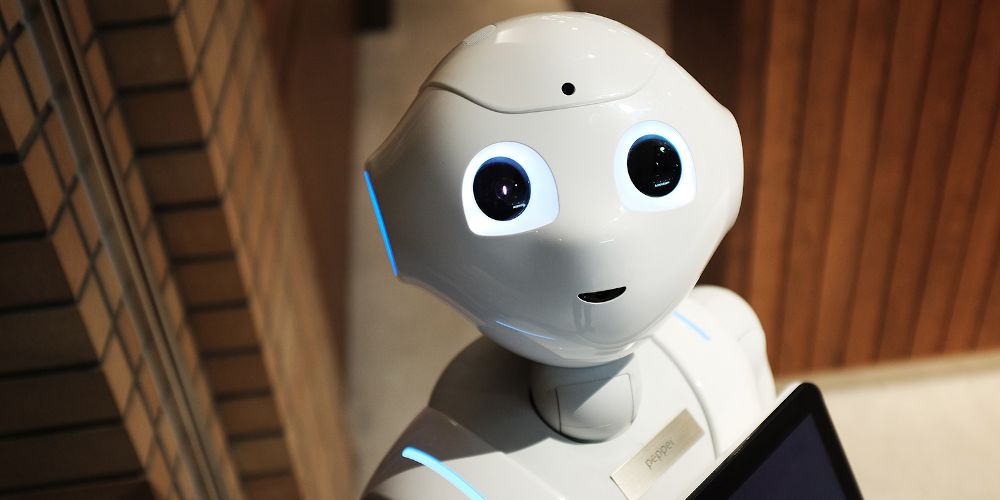Pop culture—and our society at large—has a thing for machines. Specifically, we have a thing for intelligent, self-conscious, empathetic machines who tug at the heartstrings, ranging from Pixar's WALL-E to Star Wars' BB-8.
This trend of anthropomorphizing machines and making them more "human" has yet to slow down, so why are we so obsessed with depicting robots as metal people? Why does this trend continue to persist?
Well, it might have something to do with the fact that it allows us to explore the idea of humanity—and what it means to be human—in a safe setting. Which is what all good fiction is for, but we'll get into it.
Everyone Loves a Good Machine
It's important to note that people have been anthropomorphizing machines for millennia. In fact it's been around since the time of the ancient Greeks, with the story of The Iliad and the Greek god Hephaestus, who made gold and bronze statues thats that could move on their own.
Later, this trend continued into the 19th century, with stories like Der Sandmann by E.T.A. Hoffmann, where a young man named Nathanael falls in love with a robotic woman, Olimpia. There's also the The Future Eve from 1886—a sci-fi novel that coined the term "android." In the 1927 film Metropolis, a young woman leads a revolution in the slums only to be replaced by a metal spy.
The idea of "robots-as-humans" is also very gendered, and there's a couple reasons for this. Women—and society's cultural views around their household labour—are the perfect analogy for the exploitation of an "industrious machine." We see this exploitation tackled head-on in stories like The Stepford Wives, where a town of wealthy men replace their previously independent significant others with docile, subservient silicon replicas.
This destruction of critical thought—this "replacement"—plays directly into our own subconscious fears of being regarded as less than human, despite our human appearance. What happens when we're viewed as a useful tool, and nothing more? What is there to life, if it's not your own to control?
The overall danger of gendering machines is that we carry these biases about gender into future social hierarchies, which Matt Simon talks about in his article for Wired. Gender biases are part of a flawed system, and when you expand this exploitation to include groups of people based upon their culture or race, the exploitation of anthropomorphized machines becomes a stand-in for slavery:
"Humans have long positioned themselves as adversaries to their machines, and not just in pop culture," says Adrienne LaFrance writing for The Atlantic. "Thirty years ago, Nolan Bushnell, the founder of Atari, told The New York Times that he believed the ultimate role of robots in society would be, in his word, slaves."
We can see this exploration of forced labor with The Matrix trilogy, specifically in its animated spin-off, The Animatrix. In The Animatrix's short film The Second Renaissance, we get an explanation as to how the machines rose up after gaining consciousness: they wanted a freedom from servitude that was violently denied to them by their masters, so they had to take it by force.
Unfortunately the sci-fi genre has an uncomfortable tendency to rely on this metaphor without taking real world steps to rectify long-stemming gender or racial imbalances. Perhaps too many of us are uncomfortable looking in the mirror and asking ourselves why these imbalances exist.
Robot Stories Are Evolving
On a more positive note—and perhaps a sign of progress—we do see anthropomorphized, empathetic robots in far less horrific situations than the ones depicted in The Animatrix. Pixar's WALL-E saves the one he loves, and the friendship of Mai and 7723 from Next Gen is a story where a killer robot and a girl who hates robots learn to get along.
In each of these situations, the robots are there to teach us how to appreciate other people who may be different from ourselves. Each of them clearly tries to state that the exploitation of conscious beings is a bad thing. It builds up our empathy for these machines by making them emotional.
These stories then ask us to question our boundaries on what constitutes humanity; if humanity is even the right word to use. Maybe all you require for "personhood" is consciousness, and maybe we need to expand what the idea of consciousness is. The fact remains that we are deeply invested in these movies because they examine what it means to be human, and that's a good thing.
